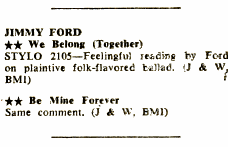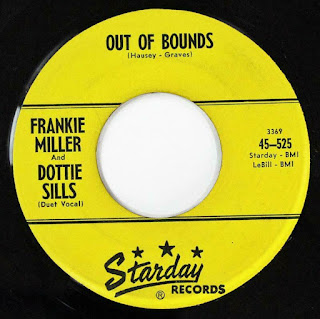Alvis Wayne is a familiar name to many of the hardcore rockabilly collectors. Ironically, Westport's most commercial recording artists never visited Kansas City nor did he had even contact to the label's owners.
Alvis Wayne Samford was born on December 31, 1937, in Paduka, Texas, being one of four children. Because of the depression, the Samfords were very poor and moved around a lot in constant search of work. Wayne spent most of his early years in rural Texas until the family found a home in Corpus Christi in 1953. Music was a part of the young boy's life early on and his main musical influences became country music singers such as Jimmie Rodgers, Hank Snow, Bob Wills, and others. But as it was for many who later became rockabilly singers, he also heard some rhythm and blues on the radio.
At at the age of ten, Wayne received his first guitar from an aunt and first learned to play "Goodnight Irene". Around the same time, he saw Bob Wills performing in a town near San Antonio. By the time he was 13, Wayne was playing night clubs on Friday nights and got to know a musician called Anthony Wayne Guion, who had a band he called "Tony Wayne and the Rhythm Wranglers". The group was on tour playing honky tonks and clubs at night and Alvis Wayne soon was asked to be part of the band. His family wasn't happy with it at all but his parents finally agreed and so Wayne went on tour with the Rhythm Wranglers in 1956.
 |
| Alvis Wayne, 1950s promo picture |
Tony Wayne booked gigs in South Texas that were not paid very good and they went home to Corpus Christi after they learned it was too hard being on the road without money and even without food. Alvis Wayne then joined Al Hardy's western swing band and played regularly in Hardy's club. By the summer of 1956, Tony Wayne had contacted the Ruf brothers in Kansas City, Missouri, who ran the Westport record label. They gave Tony Wayne and the band a recording contract and asked for some rock'n'roll songs. Both Tony and Alvis Wayne, at that time, mainly sang country music but that didn't matter. Tony Wayne had already written a couple of songs for a recording session which he intended to be sung by his young protégé Alvis.
 |
| Billboard January 20, 1958 |
Wayne was back in the studio around September 1957 (other sources state the session was already cut in late 1956), recording the raw and classic "Don't Mean Maybe, Baby" as well as the ballad "I'd Rather Be with You", which became probably his best selling record. The same session also produced "I Gottum", which saw release not until the 1970s. Both "Don't Mean Maybe, Baby" and "I'd Rather Be with You" were written by Tony Wayne and were coupled on Westport #138, released in early November 1957 and the record sold very well in South Texas. It even secured a release in Australia on Bell and was also issued in the early 1960s on Starlite in the UK.
Both records made Wayne a local celebrity and he went on the road through Texas and also played the Louisiana Hayride. 1958 saw his final release on Westport with "Lay Your Head on My Shoulder," a song written by James Bacon, who had a doo-wop group. Tony Wayne arranged a session in a Houston studio with Alvis being backed by studio musicians and Bacon's singers.
By 1960, Wayne decided to quit his music career and joined the Air Force. He never gave up performing but reduced it. He cut two records in the 1960s and also recorded for Ronnie Weiser's Rollin' Rock label in the 1970s. The rockabilly revival secured Wayne new fans in Europe and he began to appear on shows there. He also returned to the studio several times, releasing two albums in the new century. In later years, his health caused him to cease his performing activities and he spent his last years in Corpus Christi. Alvis Wayne died on July 31, 2013.

























